
Click to Skip Ahead
Unfortunately, cats can get into many dangerous things around the house, including rat poison. Since it is designed to eliminate rodents, it often contains ingredients to make it taste better, which might attract a cat, and they may also ingest it by accident. Rat poison can pose a real danger to cats and might even kill them, so it’s important to contact the vet immediately if you notice any signs of poisoning in your cat or even suspect it may have occurred. Keep reading for the steps to take if your cat accidentally ingests rat poison, along with frequently asked questions to help you be better prepared for this situation.
What If My Cat Ingests Rat Poison?
Contact a Veterinarian
Call your veterinarian or an emergency veterinary clinic as soon as possible. Provide them with information about the type of rat poison, the amount that you believe that your cat ingested, and any signs that your cat might be experiencing.
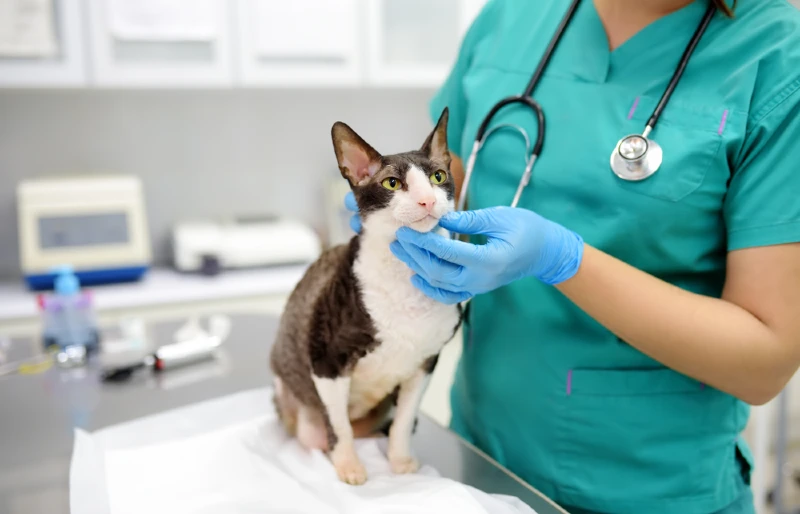
Do Not Wait
Rat poison can be extremely toxic and the effects can be life threatening. Don’t wait to see if signs develop. Instead, contact the vet immediately if you suspect that your cat has consumed poison.
Collect Information
If you have the packaging or any information about the rat poison, provide this to the veterinarian. Different types of toxins have unique antidotes and treatment protocols.
Monitor Your Cat
Keep a close eye on your cat’s behavior and any signs that develop. The signs can vary depending on the type of poison that they ingest.
Do Not Try Home Remedies
Attempting to induce vomiting or giving the cat certain substances can worsen the situation. Always follow the guidance of the veterinarian.
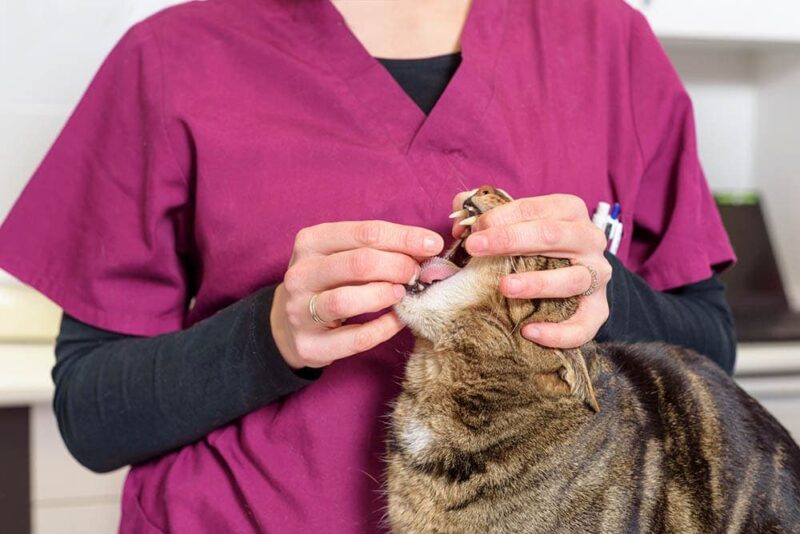
Limit Access to Poison
If you can, safely remove any remaining rat poison from the area to prevent further exposure.
Follow Veterinary Advice
Once you’ve spoken to the veterinarian, follow their instructions carefully. They might recommend bringing your cat in for examination and treatment. Depending on the poison and the severity of the situation, your cat might need supportive care, activated charcoal to limit absorption of the poison, or other interventions.
Be Prepared
If your veterinarian advises bringing your cat to the clinic, be prepared for treatment. Have a carrier ready, and follow their instructions for safely transporting them.
Update Your Veterinarian
Keep your veterinarian updated on your cat’s condition and any changes in clinical signs. This information is vital for adjusting the treatment plan if needed and for keeping your cat on the fastest track to recovery.
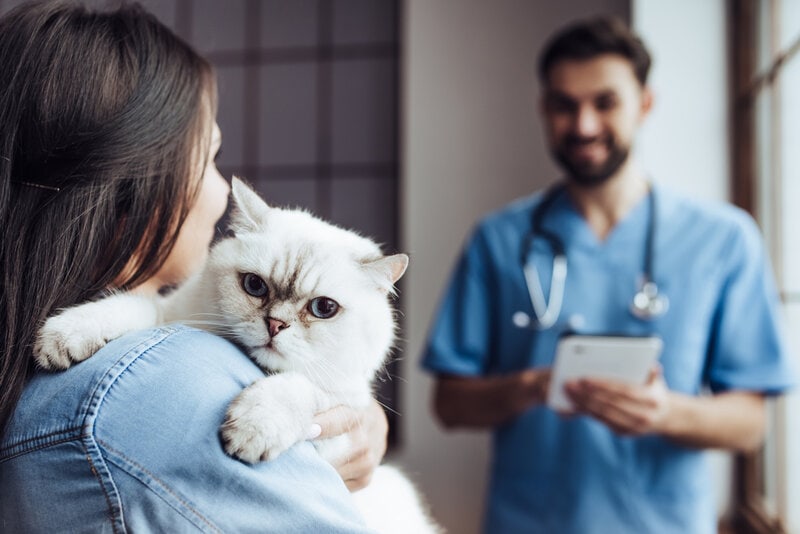
Signs That Your Cat Ingested Rat Poison
Nothing
In the early stages of poisoning, you may notice nothing. If you have a suspicion that your cat may have been exposed to rat poison, or any other poison, reach out immediately for professional veterinary advice.
Bleeding
Anticoagulant poisons can lead to external and internal bleeding. Look for blood in urine, feces, vomit, or bleeding from the gums or nose.
Lethargy
Poisoned cats may become unusually weak, lethargic, or reluctant to move, play, or eat.
Loss of Appetite
A sudden decrease in appetite, accompanied by weight loss, can indicate poisoning.
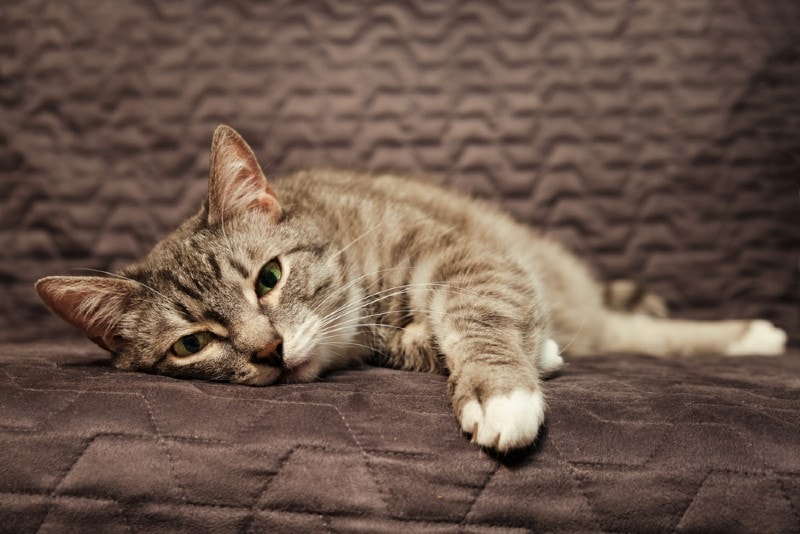
Vomiting and Diarrhea
Gastrointestinal problems like vomiting and diarrhea might occur after ingesting toxic substances.
Tremors or Seizures
Neurotoxic poisons like bromethalin can cause tremors, seizures, and muscle twitching in your cat.
Keeping Your Cat Safe
Set Up Prevention Best Practices
The best way to protect your cat is prevention. Minimize the need for rat poison by practicing effective rodent control measures, such as sealing entry points to your home and keeping food sources inaccessible.

Choose Pet-Friendly Alternatives
Consider live traps for rodents, instead of poison. Safer for pets, and environmentally friendly, as well.
Keep Cats Indoors
Indoor cats are considered less likely to encounter poisoned rodents or consume toxic substances outdoors. Creating an enriching indoor environment can help keep your cat content.
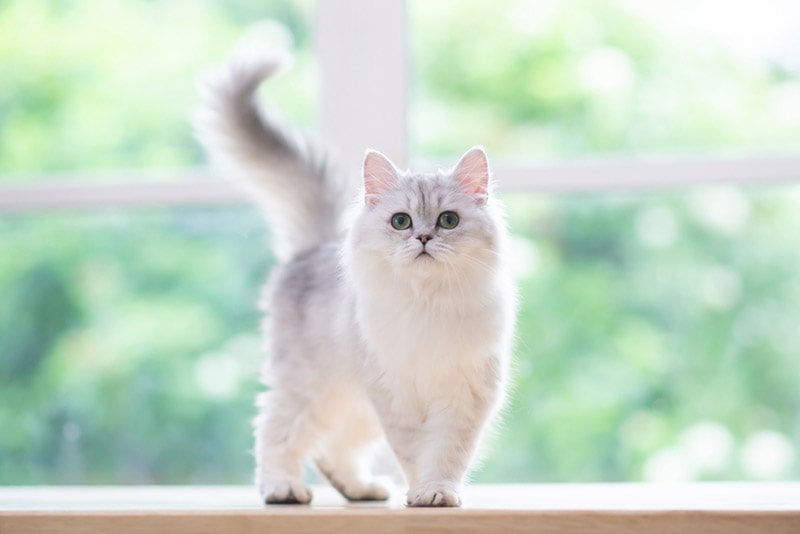
Supervise Outdoor Activities
If your cat enjoys the outdoors, supervise their activities to prevent hunting and scavenging behavior that might cause them to encounter poison or an animal that has consumed poison.
Types of Rat Poison
Anticoagulants
Anticoagulant rodenticides interfere with blood-clotting mechanisms, causing rodents to bleed internally. These poisons are slow acting, enabling the poisoned rodent to potentially consume multiple doses before succumbing to the effects. This delay raises concerns about secondary poisoning for pets like cats.
Cholecalciferol
Cholecalciferol, or vitamin D3, is toxic when ingested in large amounts. It leads to calcium buildup in the body, affecting various organs. Cats are particularly sensitive to this poison, and ingestion of even small amounts can be fatal.
Bromethalin
Bromethalin is a neurotoxic rodenticide that affects the central nervous system. Unlike anticoagulants, bromethalin doesn’t rely on prolonged ingestion and kills quickly, but it can be more dangerous for cats that might consume dead rodents.
Zinc Phosphide
Zinc phosphide reacts with stomach acid, releasing toxic phosphine gas in the rodent’s stomach, and can potentially harm cats that ingest poisoned rodents.
How Could a Cat Ingest Rat Poison?
Directly
Cats might eat rat poison pellets if they resemble food or if they’re attracted to the scent. Curious cats, especially kittens, are more likely to explore their environment using their mouths, putting them at risk of ingesting poison.
Secondary Poisoning
Cats that hunt rodents are at risk of secondary poisoning. If a cat consumes a rodent that has ingested rat poison, they can suffer from its effects, which is a significant concern, particularly with slow-acting anticoagulant poisons.
Frequently Asked Questions
Can Rat Poison Harm a Cat If They Eat a Poisoned Rat?
Yes, there is a risk. Cats that consume poisoned rodents can be exposed to the effects of the rat poison, leading to being poisoned themselves. Contact a veterinarian and monitor your cat’s behavior if you suspect that they have ingested a poisoned rodent.
Can Indoor Cats Be Affected by Rat Poison?
Yes, even indoor cats can be affected by rat poison if they ingest a poisoned rodent that has entered the house. That said, keeping your cat indoors can reduce their risk of exposure to poisoned rodents.
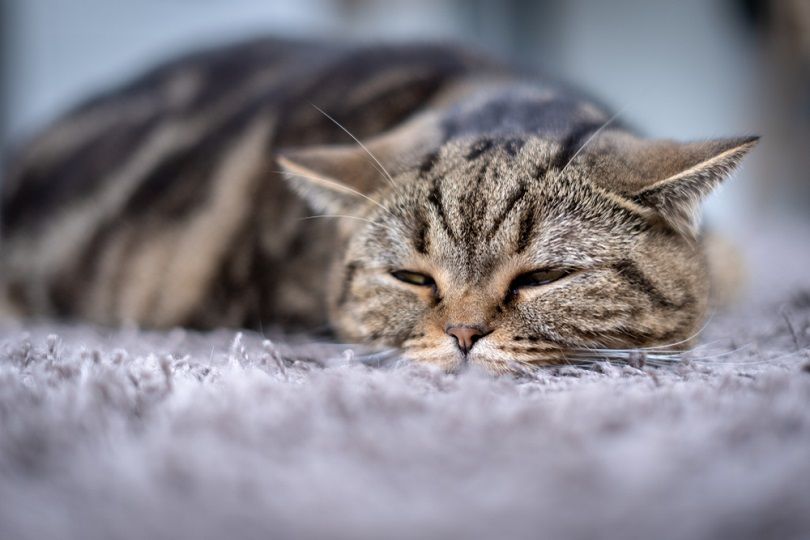
Is There Treatment for Rat Poison Poisoning in Cats?
The treatment for rat poisoning varies depending on the type of poison. Treatments exist for certain varieties, but the best thing to do is to seek immediate veterinary care, as only a veterinarian can provide the appropriate treatment based on the specific situation.
Summary
Unfortunately, consuming rat poison directly or secondhand by consuming a poisoned animal can result in serious health problems and even death for a cat. If you suspect that your cat has consumed poison, contact a vet immediately, and inform them of the type of poison and how much your cat ate. This way, they start getting the help that they need for the best chance of a full recovery. There are various types of poison, so learn about each one. Keep an eye out for the clinical signs, including lethargy, loss of appetite, vomiting, and blood in the stool. Regularly inspect your home, and seal off any entry points that rodents might use, and if you must use rat poison, choose a pet-friendly option if possible.
- Related Read: What Animals Attack Cats? Be Aware of these Predators!
Featured Image Credit: Africa Studio, Shutterstock







